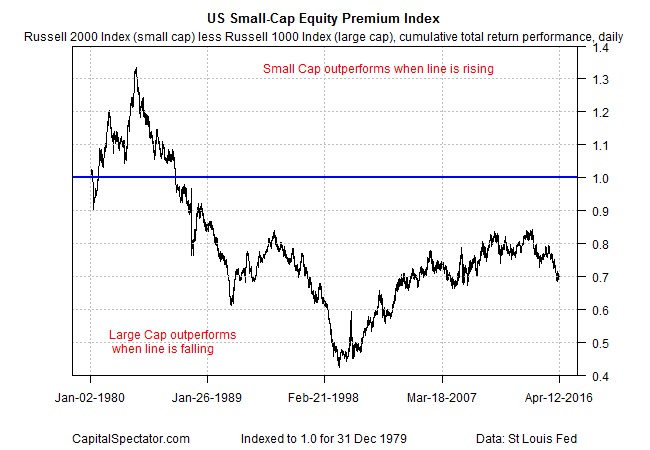Yesterday’s post focused on the discouraging record for value investing over the last decade, but history looks even worse for the so-called small-cap premium in the US stock market. Yes, there have been periods when small cap shines relative to large caps, but the strategy has been a loser as a buy-and-hold proposition since 1980, based on Russell indexes. Excluding the “junk” or focusing on the “value” opportunities in the small-cap realm offers possible solutions, but the original concept using the Russell benchmarks is battered and bruised.
Consider the cumulative results of the daily return spread for the Russell 2000 Index (a popular measure of US small caps) less the Russell 1000 (large caps) since the close of 1979. A dollar invested at the start of this period has faded to roughly 70 cents as of yesterday (Apr. 12, 2016). To be fair, there have been multi-year periods during the interim when small caps have outperformed large caps. But over the grand sweep of the last 35 years or so, sans timing, the small-cap concept has been a dog.

There are several explanations for why the small cap premium has been so elusive across the decades, although the most devastating view is that it was all a big head fake. Critics are quick to point out that the disappointing returns for small caps followed the arrival of the famous study by Rolf Banz in 1979 that put the strategy on the map and launched an industry dedicated to mining this premium. As NYU finance professor Aswath Damodaran recently asked: “The Small Cap Premium: Where is the beef?”
Arguably the best case for salvaging the strategy lies with the notion that it’s best to ignore the financially troubled firms. As I discussed last year, a recent study by Cliff Asness of AQR Capital Management and several co-authors–“Size Matters, If You Control Your Junk”—points to a fix by focusing on small companies with relatively strong financials.
Nonetheless, small-cap investing as originally conceived comes with a hefty degree of empirical baggage these days. Optimists counter that the general run of disappointing small-cap performance lays the groundwork for hefty opportunities for the years ahead. Meantime, there’s another argument that small-cap value is where the real action is, as per the Fama-French research. In a future post I’ll crunch the numbers and run a reality check on that idea.
As for traditional small-cap investing a la Banz, history hasn’t been kind to the original strategy, at least when measured in the Russell indexes as a buy-and-hold setup. That doesn’t mean that the small-cap concept is dead. But some fancy footwork is required to make it work.
